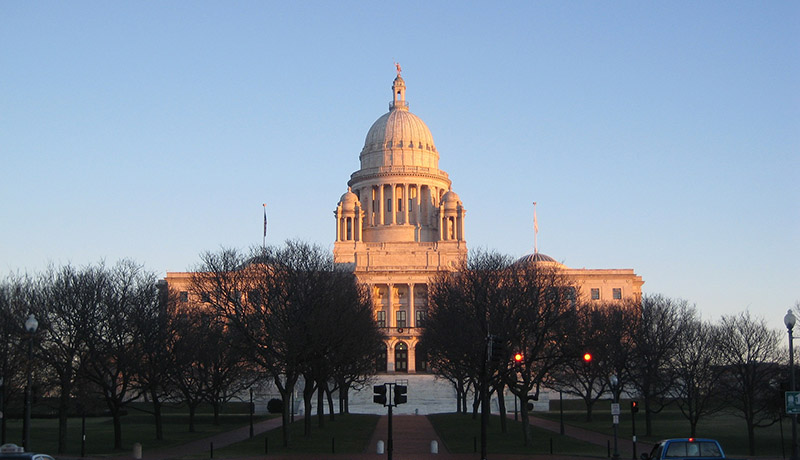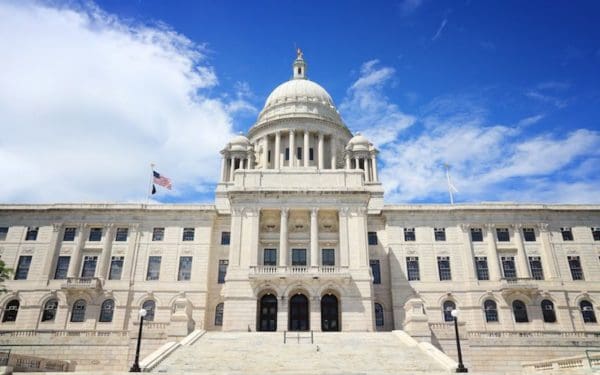
Without a Global Warming Solutions Act, Rhode Islanders have no assurance that we'll even come closer to meeting our goal of cutting emissions 80 percent by 2050. Photo: Creative Commons
While Rhode Island has goals for reducing climate-damaging emissions, and signed onto the Paris Accord in 2017, Governor Raimondo has yet to live up to her campaign commitment on climate. In failing to act, our state has fallen behind its neighbors.
The Governor supported the concept of mandatory, enforceable, economy-wide reductions in carbon emissions during her re-election campaign. That said, she has not yet supported the only legislation that would make that a reality: the Global Warming Solutions Act (H-5444; S-658). This Act would ensure our state reduces its carbon pollution and combats climate change.
Climate change is right here, right now. Earlier this year, a Providence Journal article showed that home values in Rhode Island have lost $44.7 million in appreciation between 2005 and 2017 due to greater risks of flooding. The article also noted that the state’s Coastal Resources Management Council is now planning for up to 11.5 feet of sea level rise by the end of this century. If we all don’t step up – every state, every person – to slash emissions, we’re only going to see worse effects to come. Even small states like Rhode Island share responsibility for taking action. It will take every state, from the largest to the smallest, to solve this crisis.
Why We Need the Global Warming Solutions Act
Rhode Island’s goals are just words on paper when there’s no way to ensure we achieve them. Without enforceable mandates, Rhode Islanders have no assurance that we’ll even come close to cutting emissions by 80 percent by 2050 (let alone meet our incremental target of 45 percent by 2035). In fact, a recent report entitled Business As Usual highlights the Ocean State’s failure to follow the climate laws that are already on the books. This underscores the need to make our climate goals mandatory and enforceable.
Rhode Island needs to protect its residents, its economy, and its environment by taking action now to reduce the emissions that are causing climate change. It can do so by following the lead its neighbors and passing a Global Warming Solutions Act.
The Global Warming Solutions Act before the legislature is modeled on a law that has been effective in Massachusetts for more than a decade. Connecticut has a similar law, and this year Maine and Vermont are also considering comparable measures.
How Does the Global Warming Solutions Act Work?
The Global Warming Solutions Act requires the state to reduce climate-damaging emissions in ways that are measurable, incremental, and enforceable. These reductions are outlined in five-year increments to ultimately meet our existing 45 and 80 percent targets.
The Act uses state agencies that we already have, such as the Departments of Environmental Management and Transportation, to create and implement plans to cut emissions across the whole economy. This could include lowering emissions in the electricity sector by ramping up clean energy, in the transportation sector by switching to electric cars and trucks, and in the building sector by boosting energy efficiency programs. Each agency will use its particular expertise to identify reasonable strategies for its sector.
The plans also must consider the costs and benefits of every measure proposed, to ensure the State moves forward in a way that takes our economy, public health, and our environment into account. Ultimately, this will help Rhode Island choose plans that will support our families and businesses while drastically cutting our climate-damaging emissions.
What About Transparency and Accountability?
The Global Warming Solutions Act also assures public transparency and open process. The public will have numerous opportunities for input during the planning process. Several reports on how this process is progressing also will be publicly available.
Additionally, the Act ensures accountability by allowing residents to take the State to court if it fails to follow its own mandates. (For instance, if Rhode Island passes the Global Warming Solutions Act but fails to meet its targets, Ocean State residents can file a lawsuit pushing the State to make progress.)
Just having a way on the books to force the State to take action will incentivize our government to take seriously its responsibility to protect Rhode Islanders and cut carbon emissions.
What Can You Do to Act on Climate?
Rhode Island needs to act now to jumpstart our renewable energy economy and help curb climate change. Passing the Global Warming Solutions Act will cut carbon pollution, create lasting local jobs, and protect all communities from the devastating impacts of climate change.
CLF will be fighting for this law at the State House. You can help by contacting Governor Raimondo at 401.222.2080 or emailing her at governor@governor.ri.gov. Tell her it’s time to step up on climate. She supported the concept of mandatory economy-wide carbon emissions in her campaign – she needs to live up to that promise by supporting the Global Warming Solutions Act.



